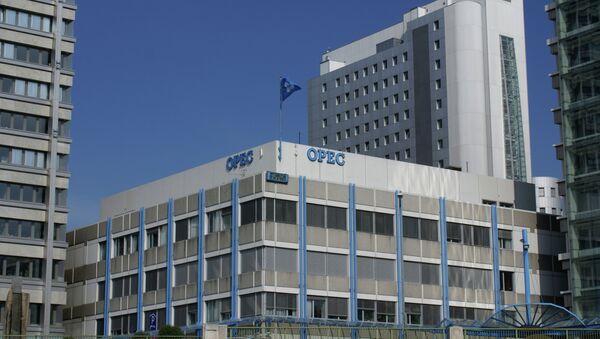MOSCOW, September 14 (RIA Novosti) -The Organization of the Petroleum Exporting Countries (OPEC) is an international organization to coordinate crude oil sales and pricing was established over 50 years ago on September 10-14 in 1960.
Leading up to OPEC's founding, the market had excesses of oil to offer, resulting from the development of huge oil fields, predominantly in the Middle East. Moreover, the Soviet Union, whose oil production doubled between 1955 and 1960, entered the market. The abundance of oil created serious competition in the market, which led to constant price reduction.
The situation forced several oil-producing countries to unite as OPEC in order to confront transnational oil corporations and stabilize prices at a required level.
OPEC was established as a permanently operating organization at a conference in Baghdad on September 10-14, 1960. Initially, OPEC members were Iran, Iraq, Kuwait, Saudi Arabia and Venezuela (the country that originated the concept). The founders were later joined by nine more countries: Qatar (1961), Indonesia (1962-2009), Libya (1962), the United Arab Emirates (1967), Algeria (1969), Nigeria (1971), Ecuador (1973-1992, 2007), Gabon (1975-1995) and Angola (2007). Currently, OPEC has 12 members after several composition changes – specifically, Angola's accession, the return of Ecuador in 2007 and the suspension of Indonesia in 2009.
The organization members control around two-thirds of the planet's discovered oil deposits. OPEC handles 40 percent of the world's oil production and 50 percent of the world's oil export.
The main goals of the organization are:
- coordinating and standardizing the member states" oil policies;
- determining more efficient individual and collective measures to protect the members" interest;
- ensuring stable prices at global oil markets;
- attending to the interests of oil-producing countries and ensuring their stable profit and commercially viable and regular supplies to consumers; the fair profit from oil industry investments; and the protection of the environment in the interests of present and future generations;
- collaborating with countries that are not members of OPEC in stabilizing the global oil market.
OPEC"s main authority is the Conference of the member states" ministers in addition to a Board of Governors with a delegate from each country. The Conference defines the main directions of OPEC policy, the means of its practical implementation, and makes decisions on reports and recommendations proposed by a Board of Governors, as well as on the budget. The Conference gives instructions and recommendations on any issues of interest for the organization. The conference includes the Board of Governors (one delegate from each member state – usually, ministers of oil, the extraction industry or energy).
The Secretary General is the highest-level official in the organization. He is also an authorized representative and head of the OPEC Secretariat.
Since 2007, Abdallah Salem el-Badri has held this post.
In total, the OPEC countries produce 29,701 million barrels of oil daily.
In 2013, the OPEC members produced around 43.4 percent of the world"s oil. In 2012, the figure was 44.6 percent. Throughout 2013, the production of crude oil by OPEC decreased by 2.5 percent.
In 2013, the OPEC member states exported 59.3 percent of oil to the Asian and Pacific countries, 17.2 percent to Europe and 16.3 percent to North America.
During the first six months of 2014, the price of the OPEC oil basket remained at $104/barrel on average.

